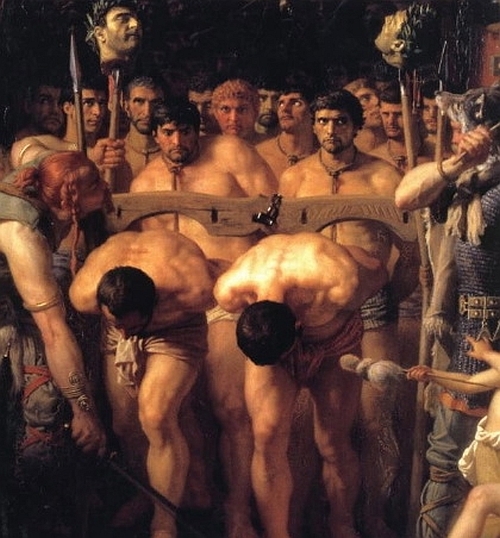
Quotiens causas belli et necessitatem nostram intueor, magnus mihi
animus est hodiernum diem consensumque vestrum initium libertatis totius Britanniæ fore. Nam et universi servitutis expertes, et nullæ ultra terræ, ac ne mare quidem securum, imminente nobis classe Romana: ita prœlium atque arma, quæ fortibus honesta, eadem etiam ignavis tutissima sunt. Priores pugnæ, quibus adversus Romanos varia fortuna certatum est, spem ac subsidium in nostris manibus habebant: quia nobilissimi totius Britanniæ eoque in ipsis penetralibus siti, nec servientium littoral aspicientes, oculos quoque a contactu dominationis inviolatos habebamus. Nos terrarum ac libertatis extremos, recessus ipse ac sinus famæ in hunc diem defendit: nunc terminus Britanniæ patet; atque omne ignotum pro magnifico est. Sed nulla jam ultra gens, nihil nisi fluctus et saxa, et infestiores Romani: quorum superbiam frustra per obsequium et modestiam effugeris. Raptores orbis, postquam cuncta vastantibus defuere terræ, et mare scrutantur: si locuples hostis est, avari; si pauper, ambitiosi: quos non Oriens, non Occidens, satiaverit. Soli omnium opes atque inopiam pari affectu concupiscunt. Auferre, trucidare, rapere, falsis nominibus imperium; atque, ubi solitudinem faciunt, pacem appellant.
When I come to reflect upon what leads to war, as well as the circumstances of our present plight, I am convinced that our combined efforts will introduce liberty to all of Britain. For we are all without the plague of slavery; and there is no land behind us, nor does
even the sea afford a refuge, whilst the Roman fleet hovers around. Thus the resort to arms, which is at all times honorable to the brave, now offers even to cowards the only form of safety. In all the battles which have been fought to this point, with their varied outcomes, against the Romans, our countrymen have placed their confidence, their hopes, their treasure in us: for we, the best sons of Britain, and her last best hope, far from the view of captive shores, have kept our vision and thoughts pure from the corrupting influence of subjugation. Seated at the extremities of land and of freedom, we have so far been defended to this day by our very remoteness and by our notoriety. The extremity of Britain is now known; and whatever is unknown becomes an object of curiosity. But there is no nation beyond us; nothing but waves and rocks, and the still more hostile Romans, whose arrogance we cannot hope to avoid, not even by submission and servitude. They have plundered the world, stripping naked the land in their hunger, they loot even the ocean: they are driven by greed, if their enemy be rich; by ambition, if poor; neither the wealth of the east nor the west can satisfy them: they are the only people who behold wealth and indigence with equal passion to dominate. They ravage, they slaughter, they seize by false pretenses, and all of this they hail as the construction of empire. And when in their wake nothing remains but a desert, they call that peace.
—Cornelius Tacitus, De Vita Gnæi Julii Agricolæ cap. xxx (98 CE) in the Loeb Library ed., vol. 35, p. 80 (S.H. transl.)


